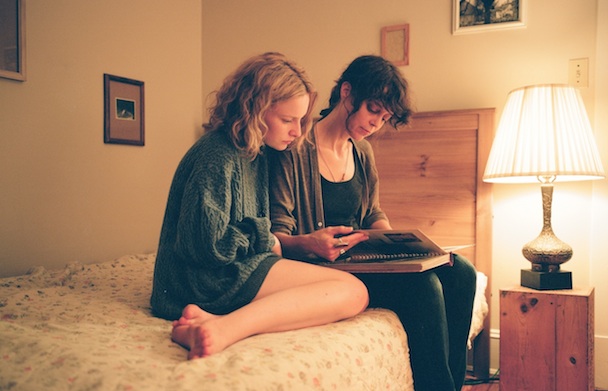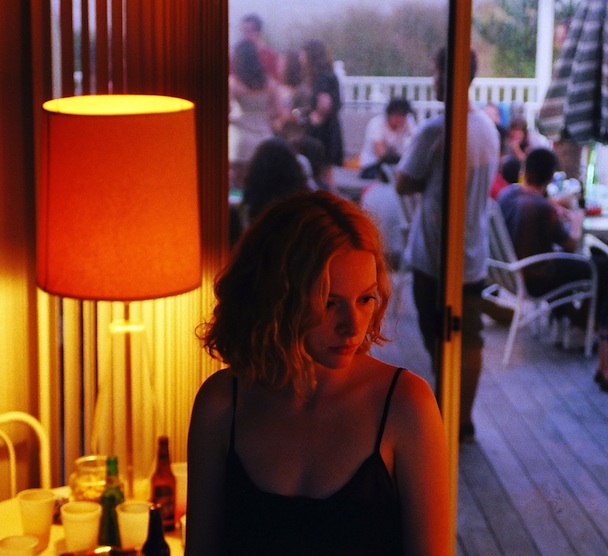Between Green Day's Broadwayfication of American Idiot to the recent buzz about a musical version of '80s cult classic Heathers premiering last month in L.A., there's not much going in the genre that is appealing on top of the element of surprise. But this weekend, Baltimore-based filmmaker Matthew Porterfield will release his third full-length feature I Used To Be Darker (yep, that's a Bill Callahan reference), a backdoor musical melodrama about a family in his home city. The film's cast is primarily comprised of unknowns, including indie singer-songwriter Kim Taylor and Ned Oldham, frontman of the Anomoanon and brother of Will. Taylor's and Oldham's music are both centerpieces of the script's framework, but instead just using the tunes as inspiration, they are embedded into the film, the lyrics working to advance the plot or explain character-emotions -- but no one jazz-hands their way into the film, it's all done subtly, the performances crucial in equal measure to the film as the content of them. Porterfield's previous work also hinges on the significance of music, whether its the re-imagining of music from Animal Collective in his debut feature Hamilton or mourning karaoke in 2011's Putty Hill -- which includes a gut-wrenching rendition of Dolly Parton's "I Will Always Love You" performed by a pre-"Everything Is Embarrassing" Sky Ferreira. The director, who has also crafted videos for Baltimore bands Double Dagger and Dope Body (who appear in the film), spoke to us about how his lo-fi folk musical came together and the importance of music to a filmmaker. Read our Q&A and get more information about seeing I Used To Be Darker below.
STEREOGUM: This is a big week for you.
PORTERFIELD: We just opened in Baltimore [at the Charles Theatre] last week. We wanted to try opening in Baltimore before New York and LA. We’re opening at IFC [in Manhattan] this weekend.
STEREOGUM: Did you premiere it there because you wanted to test it out before you premiered it in LA and New York or because Baltimore is just that significant to you?
PORTERFIELD: More the latter. It just makes sense and feels right. Our distributor was going to do it [and]it honors Baltimore to do our commercial release here rather than another city. And I don’t think it hurt our opening, it really helps it because we were able to bring really good numbers [at home]. We can do the same in New York, when we have box office reports to show to some other theater to show to bookers who are maybe still on the fence about the film or its commercial viability. It’s really tough with a film like this where there’s no stars—it’s not a genre film, it’s a quiet family drama. You have to position the film in the best venue you can in New York and try to get it in the hands of all the major press and get as many people out as you can on Fridays and Saturdays. We luckily have about seven showtimes a day, which is good. It’ll give people a lot of flexibility. But the Friday-Saturday box office reports from opening weekend are [how] everybody will judge the success or failure of a film. We have about sixteen [follow-up] bookings now. We’re playing in a few major cities like Boston, Minneapolis. Cincinnati is a big one for us because that’s where Kim Taylor is from.
STEREOGUM: How did you end up booking at IFC Center?
PORTERFIELD: We have a distributor, a distribution company called Strand Releasing—they’ve been in the business for 30 years and they have good relationships with the major venues in NYC. For us, it was our goal to try to land IFC Center [and] they were enthusiastic about the film. John Vanco, who does a lot of the booking and runs the theaters, saw it at Sundance [and] he was enthusiastic.
STEREOGUM: I don’t know how booking played out for your more experimental work Hamilton or Putty -- obviously, Darker is not a fully straightforward narrative film, but it is a little bit more structure than the previous, too, and I’m curious if it made distribution easier.
PORTERFIELD: It’s definitely a more accessible film and resonates emotionally with audiences, as opposed to my previous features. That being said, Putty Hill was formally a little more audacious and I think people responded to that. People also responded to this view of a side of the American city that we don’t always see on screen. [I Used To Be Darker] is little, it doesn’t shout. [It’s] a modest, melodrama about a family starring four people you’ve never seen before.

STEREOGUM: Along that line, most quiet indie films don’t have a musical aspect to them and I don’t think there has ever been a musical that is entirely lo-fi folk. What was the inspiration for that as part of the storytelling?
PORTERFIELD: I’m always listening to a lot of music when I write and I try not to write — I have in the past and it’s gotten me in trouble — songs into my screenplays. [My co-screenwriter Amy Belk and I] were inspired by the music of Bill Callahan, from whom we borrowed the title, and then Kim Taylor and Ned Oldham. I knew Ned Oldham because he lived in Baltimore and Amy had gone to school with Kim, so she introduced me to her and her music. So suddenly we started writing their songs into the script and forming characters, so we asked them to play them and they agreed, which was a fantastic stroke of luck. But because they were musicians, I wanted to build a world of music in the film and make certain that it always came from the characters inside the film itself. There’s a lot of music cues and a lot of music these characters are listening to and I think that’s the exciting part. And of course there’s the performances, by Ned and Kim, by Dope Body, which play out in duration.
STEREOGUM: So it’s previously written and recorded material in the film?
PORTERFIELD: For the most part. The only exception is the song that Ned plays in the basement when he’s jamming with Jack Carneal on drums. That’s a song he wrote specifically for the film built around the words of a poem that my dad had written in the ’70s.

STEREOGUM: You have this way of incorporating music that already exists into a new world. With Hamilton, you used well-known Animal Collective songs. Is there a reason for that or is just a coincidence that you seem to invigorate this music into a visual space?
PORTERFIELD: I think what happens is when you introduce the music into a scene, it creates all the associations and effects that are based on the circumstances of that scene that you might not have guessed. I think that’s one of the reasons why music is so seductive for filmmakers. I think we rely on it too heavily to carry the emotional weight of the stories that we’re telling -- sometimes I feel like a movie is just a mixtape. But I try to figure it out by saying, “Ok, this is the scene and what kind of music is going to create a weird dichotomous or interesting relationship to what we see?” For example, in Putty Hill, one of my favorite scenes is the second tattoo scene when “Birthday Sex” is on because I feel like that recontextualized that song. Although, that was something that I heard in that apartment in the beginning of the summer so it was just one of the serendipitous encounters because music was on and it was totally surprising. I like when music can surprise and work against the visuals in some way or create new associations.
STEREOGUM: That’s a really interesting scene in that movie because it is such a “tough guy” situation -- home-tattooing in a dingy house -- and it’s so dichotomous because the Jeremih song is so twinkly and romantic. What’s interesting is that with Putty Hill, you do have sort of the opposite thing going on with regard to recontextualizing music within the film -- you also have the inverse, in that one of its stars, Sky Ferreira, has become so immensely popular after the fact. Were you surprised by that at all?
PORTERFIELD: I’m not surprised by her success because I think she’s extremely talented and I was banking on it. I don’t think we even would have been able to cast her two months later, but it worked out at just the right time. And we had built a relationship and I had been up to L.A. to see her and I had met her guardian and we had spent time together and we both trust and respect each other, but she’s blown up since. And her image has changed, as well. I don’t know if she’s happy with Putty Hill because she never does anything to promote it, but I think she’s incredible in it. I think her performance is awesome.
STEREOGUM: Has there been a spike of interest because of her?
PORTERFIELD: I think so. She has a very wide fanbase so I think a lot of young people who are fans of her music learned she was in this movie and checked it out on iTunes. So it does bring audiences in. She’s so successful and her domain is the Internet. That’s how she builds herself and she has this fanbase and they’re going to watch films at home on their laptops and access them via iTunes or whatever. So I think a lot of people see the film through Sky Ferreira.
I Used To Be Darker is out now in New York City and Los Angeles and will begin its wide release on 10/11 throughout the rest of the country.
Q&A SCREENINGS AND PERFORMANCE SCHEDULE:
10/04 Matt Porterfield with cast and crew Q&A and music from Ned Oldham, and Kim Taylor @ IFC Center, New York, NY (6:10PM, 8:10PM)
10/05 Matt Porterfield Q&A with music from Kim Taylor @ IFC Center, New York, NY (6:10PM)
10/05 Matt Porterfield with actors Hannah Gross and Deragh Campbell cast Q&A @ IFC Center, New York, NY (8:10PM)
10/05 The Anomoanon (Ned Oldham band) @ Union Pool, Brooklyn, NY (10PM, half-price with movie ticket)
10/06 Amy Belk Q&A with music from Kim Taylor @ IFC Center, New York, NY (2:10PM)
10/06 Matt Porterfield Q&A with music from Ned Oldham @ IFC Center, New York, NY (4:10PM)
10/06 Kim Taylor, Ned Oldham, & John Corneal @ The Living Room, New York, NY (10:30PM, half-price with movie ticket)







